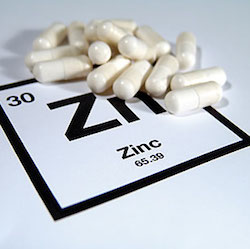
In recent months a number of new studies have emerged regarding the use of zinc in clinical settings. Zinc is necessary for normal metabolism and functioning of the reproductive, cardiovascular and nervous systems, but it is also important for the immune system, in particular for the proliferation and maturation of white blood cells (some of them are able to capture and digest microorganisms, and others – to produce antibodies). In addition, zinc is involved in the regulation of inflammation. Thus, normal levels of zinc support human resistance to inflammatory and infectious diseases.
On one anecdotal study, published in medRxiv, researchers found than when combined with medications for COVID-19 patients, “zinc sulfate increased the frequency of patients being discharged home, and decreased the need for ventilation, admission to the ICU, and mortality or transfer to hospice for patients who were never admitted to the ICU. After adjusting for the time at which zinc sulfate was added to the protocol, an increased frequency of being discharged home (OR 1.53, 95% CI 1.12-2.09) reduction in mortality or transfer to hospice remained significant (OR 0.449, 95% CI 0.271-0.744).”
In another study, researchers from Sechenov University in collaboration with colleagues from Germany, Greece and Russia reviewed scientific articles on the role of zinc containing drugs for viral infections and pneumonia, with projections on those caused by SARS-CoV-2. The results were published in the International Journal of Molecular Medicine. Though they are not making any recommendations about the use of zinc alone in a clinical setting, the research does warrant further discussion as an adjunct addition.
The scientists reviewed the results of studies on the use of zinc-containing drugs for increasing immunity and preventing viral infections, including SARS-CoV-2. Previous studies showed that zinc and its binding substances can slow down the work of RNA polymerase (an enzyme that synthesises viral RNA molecules) of coronaviruses and suppress their spread in the body. One of the substances that stimulate the cellular zinc uptake, chloroquine, has already been tested on patients with SARS-CoV-2, but its strong side effects make it necessary to look for other compounds with a similar effect or use zinc separately. However, both options have not been sufficiently studied or tested yet.
In the abstract, the researchers note the following:
- Despite the lack of clinical data, certain indications suggest that modulation of zinc status may be beneficial in COVID‑19. In vitro experiments demonstrate that Zn2+ possesses antiviral activity through inhibition of SARS‑CoV RNA polymerase.
- Indirect evidence also indicates that Zn2+ may decrease the activity of angiotensin‑converting enzyme 2 (ACE2), known to be the receptor for SARS‑CoV‑2.
- Improved antiviral immunity by zinc may also occur through up‑regulation of interferon α production and increasing its antiviral activity.
- Zinc possesses anti‑inflammatory activity by inhibiting NF‑κB signaling and modulation of regulatory T‑cell functions that may limit the cytokine storm in COVID‑19.
- Improved Zn status may also reduce the risk of bacterial co‑infection by improving mucociliary clearance and barrier function of the respiratory epithelium, as well as direct antibacterial effects against S. pneumoniae.
- Zinc status is also tightly associated with risk factors for severe COVID‑19 including ageing, immune deficiency, obesity, diabetes, and atherosclerosis, since these are known risk groups for zinc deficiency.
- Therefore, in regard to COVID-19, Zn may possess protective effect through reducing inflammation, improvement of mucociliary clearance, prevention of ventilator‑induced lung injury, modulation of antiviral and antibacterial immunity.
- However, further clinical and experimental studies are required.
Zinc and other Respiratory Conditions
Observations of the development of other viruses, such as rhinoviruses (this family includes pathogens of acute respiratory diseases), show that an increase in the level of zinc in cells suppresses replication (reproduction) of the virus and stimulates production of interferon alpha, which has an antiviral activity.
In addition, zinc deficiency is considered as one of the risk factors for the development of pneumonia: it increases the susceptibility to infectious agents and the disease duration. Several studies show the effectiveness of zinc-containing drugs in decreasing severity and duration of symptoms and reducing the prevalence of pneumonia. However, in general, data on the use of zinc as a therapy, rather than prevention, are contradictory.
Another possible application of zinc is modulation of inflammation. Existing data show that zinc ions have an anti-inflammatory effect, reducing damage to lung tissue in pneumonia. Zinc also helps the body resist bacteria, and bacterial pneumonia frequently occurs in patients with secondary viral infections.
‘According to the current estimates, the risk of zinc deficiency is observed in more than 1.5 billion people in the world. In the United States, it is estimated that 12% are deficient. While in Russia, deficiency occurs in 20-40% of the population; in some regions it reaches 60%. Given the crucial role of zinc in regulation of immunity, one can propose that its insufficiency may be considered as a risk factor for infectious diseases,’ said the research leader, head of the Laboratory of Molecular Dietetics at Sechenov University, Professor Anatoly Skalny.
Conclusion/ “According to current research, adequate zinc status can bring down the likelihood of infectious respiratory diseases, pneumonia and its complications. Further clinical and experimental studies are strongly required to elucidate the potential role of Zn deficiency in COVID-19 susceptibility, as well as effects of Zn supplementation, and the underlying mechanisms.”
Click Here for Full Text Study




